自考英语(一)英语语法基础材料:代词
自考英语英语语法基础材料代词
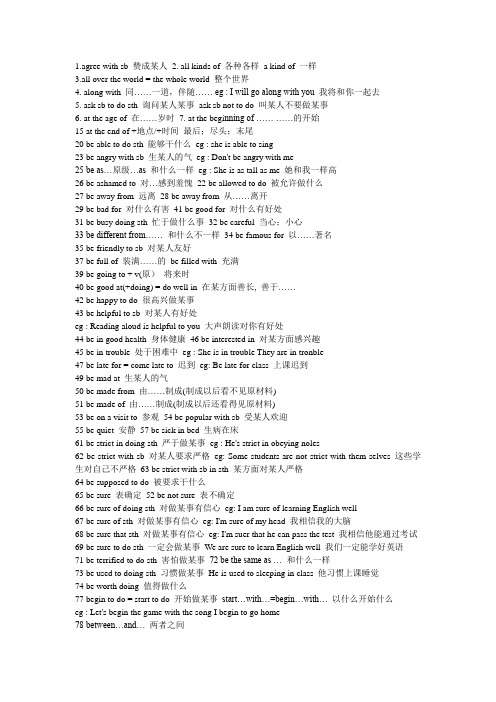
1.agree with sb 赞成某人2. all kinds of 各种各样a kind of 一样3.all over the world = the whole world 整个世界4. along with 同……一道,伴随…… eg : I will go along with you 我将和你一起去5. ask sb to do sth 询问某人某事ask sb not to do 叫某人不要做某事6. at the age of 在……岁时7. at the begi nning of …… ……的开始15 at the end of +地点/+时间最后;尽头;末尾20 be able to do sth 能够干什么eg : she is able to sing23 be angry with sb 生某人的气eg : Don't be angry with me25 be as…原级…as 和什么一样eg : She is as tall as me 她和我一样高26 be ashamed to 对…感到羞愧22 be allowed to do 被允许做什么27 be away from 远离28 be away from 从……离开29 be bad for 对什么有害41 be good for 对什么有好处31 be busy doing sth 忙于做什么事32 be careful 当心;小心33 be different from…… 和什么不一样34 be famous for 以……著名35 be friendly to sb 对某人友好37 be full of 装满……的be filled with 充满39 be going to + v(原)将来时40 be good at(+doing) = do well in 在某方面善长, 善于……42 be happy to do 很高兴做某事43 be helpful to sb 对某人有好处eg : Reading aloud is helpful to you 大声朗读对你有好处44 be in good health 身体健康46 be interested in 对某方面感兴趣45 be in trouble 处于困难中eg : She is in trouble They are in tronble47 be late for = come late to 迟到eg: Be late for class 上课迟到49 be mad at 生某人的气50 be made from 由……制成(制成以后看不见原材料)51 be made of 由……制成(制成以后还看得见原材料)53 be on a visit to 参观54 be popular with sb 受某人欢迎55 be quiet 安静57 be sick in bed 生病在床61 be strict in doing sth 严于做某事eg : He's strict in obeying noles62 be strict with sb 对某人要求严格eg: Some students are not strict with them selves 这些学生对自己不严格63 be strict with sb in sth 某方面对某人严格64 be supposed to do 被要求干什么65 be sure 表确定52 be not sure 表不确定66 be sure of doing sth 对做某事有信心eg: I am sure of learning English well67 be sure of sth 对做某事有信心eg: I'm sure of my head 我相信我的大脑68 be sure that sth 对做某事有信心eg: I'm suer that he can pass the test 我相信他能通过考试69 be sure to do sth 一定会做某事We are sure to learn English well 我们一定能学好英语71 be terrified to do sth 害怕做某事72 be the same as … 和什么一样73 be used to doing sth 习惯做某事He is used to sleeping in class 他习惯上课睡觉74 be worth doing 值得做什么77 begin to do = start to do 开始做某事start…with…=begin…with… 以什么开始什么eg : Let's begin the game with the song I begin to go home78 between…and… 两者之间80 both = the same(as) = not different(from) 表相同82 by the end of 到……为止84 care 关心85 catch up with sb 赶上某人86 chat with sb 和某人闲谈take sb to + 地点带某人去某地87 come in 进来88 come over to 过来89 come up with 提出90 communicate with sb 和某人交流91 consider + doing 考虑做什么92 dance to 随着……跳舞eg : She likes dancing to the music 她喜欢随着音乐跳舞93 decide to do sth 决定做某事94 do a survey of 做某方面的调查95 do better in 在……方面做得更好96 do wrong 做错97 Don't forget to do sth 不要忘了做某事98 Don't mind +doing /从句/名词不要介意……72.be terrified of 非常害怕的be afraid to+V原形害怕干某事be afraid of+名词/代词/V ing73 be used to doing sth 习惯做某事He is used to sleeping in class 他习惯上课睡觉74 be worth doing 值得做什么be on display 在展出by accident 偶然77 begin to do = start to do 开始做某事start…with…=begin…with… 以什么开始什么eg : Let's begin the game with the song I begin to go home78 between…and… 两者之间80 both = the same(as) = not different(from) 表相同82 by the end of 到……为止complain about 抱怨…… consider+Ving考虑change…into 把…变成compare sb. to 把…比作cover…with 用…盖come out出版care 关心85 catch up with sb 赶上某人86 chat with sb 和某人闲谈take sb to + 地点带某人去某地87 come in 进来88 come over to 过来89 come up with 提出90 communicate with sb 和某人交流91 consider + doing 考虑做什么92 dance to 随着……跳舞93 decide to do sth 决定做某事94 do a survey of 做某方面的调查95 do better in 在……方面做得更好96 do wrong 做错97 Don't forget to do sth 不要忘了做某事Don't mind +doing /从句/名词不要介意……103 expect to do sth 期待做某事110 fit to sb = be fit for sb 适合某人104 fall down 摔下来fall off 从哪摔下来105 fall in love with sb /sth 爱上什么106 far from 离某地远eg : The school is far from my home107 find +it +adj +to do 发现做某事怎么样108 find sb/sth +adj 发现什么怎么样?eg : I find the book interesting114 get a part-time job = find a part-time job115 get along well with sb = get on well with sb 与某人相处得好116 get along with sb = get on with sb 与某人相处117 get ready for = be ready for 为什么而准备eg : I get ready for math118 get sb in to trouble 给某人麻烦119 get sb to do sth120 get…from… 从某处得到某物121 give a talk 做报告eg: He is give a tall122 give sth to sb give sb sth 给某人某物124 go on to do 去做下一件事go on doing 继续做这件事127 good way to 好方法128 hate to do 讨厌没做过的事hate doing 讨厌做过的事129 have a party for sb 举办谁的晚会130 have a talk 听报告谈一谈132 have been to …( 地方)…去过某过地方have gone to …(地方)去了某地还没回来133 have fun +doing 玩得高兴137 have…time +doing134 have sth to do 有什么事要做135 have to do sth 必须做某事136 have trouble (problem) (in) doing sth 做什么事情有麻烦138 have…(时间)…off 放……假eg: I have month off 我请一个月得假139 hear sb +do/doing 听见某人做某事/正在做某事140 help a lot 很大用处141 help sb with sth \one's sth 帮助某人某事(某方面)help sb (to) do sth 帮助某人做某事142 hope to do sth 希望做某事143 How about(+doing) = What about(+doing)144 how do you like = what do you think of 你对什么的看法146 if :如果,假如(全部接一般时态)+条件语态从句eg: I'll go to LuZhou if it does't rain 假如明天不下雨,我就去泸州If they change the plan they will let me know 假如他们要改变计划,他们会让我知道的I'll go to England ,if I have enough money next year 如果我明年由足够的钱,我就要去英国in one's opinion = sb think 某人认为in some ways 在某些方面in the end = finally(adv) 最后150 in the north of… 什么在什么的北方(north 北sowth 南west 西east 东)151 in the sun 在太阳下152 increase 增加153 instead of +(名)代替eg: I like English instead of math 我喜欢英语而不喜欢数学154 introduce sb to sb 介绍某人给某人introduce oneself 自我介绍155 invite sb to do sth 邀请某人做某事156 It takes sb sometime to do sth 做某人花掉某人多少时间eg : It took me 5 minutes to do my homework It takes me half an hour to cook157 It's +adj +for sb to do sth 对某人来说做某事怎么样158 It's +adj +to do 做某事怎么样159 It's +adj for sb 对于某人来说怎么样It's +adj of sb 对某人来说太怎么样160 It's +adj(for sb) to do(对某人来说)做某事怎么样It's +adj of sb to do sth 对某人来说做某事太怎么样eg : It's nice of you to help me with my English161 It's a good idea for sb to do sth 对…来说是个好主意162 It's important to sb 对某人来说很重要eg: It's important to me163 It's time to do sth It's time for sth 到了该去做某事的时间eg : It's time to have class It's time for class 该去上课了164 join = take part in 参加165 just now 刚才166 keep +sb /sth +adj /介词短语让什么保持什么样?167 keep out 不让…… 进入169 key to +名词表示:某物的钥匙或某题的答案170 key to… anser to … key 可以是答题或钥匙171 laugh at… 取笑…… eg : Don't langh at others We langhed at the joke172 learn by oneslfe 自学173 learn from sb 向某人学习174 learn to do sth 学做某事175 let sb do sth 让某人做某事176 Let sb down 让某人失望177 live from :离某地远178 live in +大地方/at +小地方居住在某地eg: I live in LuZhou179 look after = take care of 照顾,照看180.lose one's way 谁迷路eg : Lose your way 你迷路181 make a decision to do sth 决定做某事182 make friends with sb 和谁成为朋友eg : I want to make friends with you183 make it early 把时间定的早一点184 make on exhibition of oneself 让某人出洋相186 make sb /sth +adj 使某人(某物)怎么样eg : Y ou must made your bed clean187 make sb /sth adj 使某人/某物怎么样188 make sb do sth 让某人做某事189 make up be made up of (被动语态)由……组成190 make…difference to… 191 mind sb to do mind one's doing 介意……做什么192 most +名most of +代193 much too +形容词must be 一定195 need +名词196 need sb do sth 需要某人做某事197 need to do (实义动词)need do (情态动词)198.no /neithr of hate to do no /neithr of hate doing 199 no +名词200 not anymore = no more 再也不…… eg: He cried no more 他再也不哭201 not… (形、副)at all eg: He's not tall at all she doesn't junp far at all202 not…at all 一点都不203 not…either 表否定,也不204 not…until 直到…才…205 offer / provide sb with sth 给某人提供206 offer sb sth 提供什么东西给某人207 on one's way to… 在谁去那的路上208 on the one hand 一方面on the other hand 另一方面209 on the phone = over the phone 用电话交谈210 on time 准时in time 及时211 one day =some day =someday 一天,有一天212 one of +可数名词的复数形式213 one to another 一个到另一个214 over and over agin 一遍又一遍的eg : He cleaned the floor over and over agin215 part-time job 兼职工作fall-time job 全职工作216 pay for… 付……钱pay the bill 开钱,付钱217 please +do 218 please help yourself 219 pleased with sb 220 pool into = pore into221 practice +doing 练习做某事222 prefer sth to sth 相对…更喜欢… eg : I prefer physics to chemisty 在物理和化学中,我更喜欢物理prefer doing to sth 更喜欢去做…不愿意去做… eg: He prefers riding a bike to diving 他更喜欢骑自行车,不开小车prefer to do sth rather than do sth 宁愿做…也不愿eg: My unde prefers to buy a now car rather than repaiv the used one 我叔叔更喜欢买新的车,也不去修旧车prefer sb not to do sth 更愿意… eg: I prefer her not to come 我不喜欢她不来223 pretend to do sth 装着去做什么pretend that 从句eg : He pretended that he did not know the answer 他装着不知道答案224 rath er…than 宁可…也不…eg : I would rather be a doctor than a teacher 我愿肯当医生,也不当老师225 regard…as 把…当作…eg: Please give my best regards to your family 请带我向你的家人我最好的问候226 remid sb about sth 提醒某人什么事remid sb to do sth 提醒某人做某事eg : he remids me about cooking (he remids me to cook 他提醒我做饭227 remid sb of sth 使某人想起什么eg : the pictures remind me of my school days 这照片使我想起了我的学校the words that (which) the teacher talke to remind me of my mother28 return sth to sb 还什么东西给某人29 say to oneself 对自己说30 say to sb 对某人说231 sb spend somemoney on sth 花了多少钱在某事上232 sb spend sometime with sb 花了多少时间陪谁233 sb spend sometime(in) doing sth 花了多少时间做某事234 sb with sb +is sb and sb +are235 see sb do 看见某人做过某事see sb doing 看见某人正在做某事236 seem to do/be +adj 显得怎么样eg : Y ou seem to be tired Y ou seem to be happy237 send +sb sth 送给某人某物238 send…to…把什么寄到哪里去?239 shock 使……震惊eg : Oh , It's only you ! Y ou give me a shock 啊,是你呀!吓我一跳240 show sb sth 向某人展示某物eg : I show her the book.241 show sb sth = show sth to sb 拿什么东西给某人看eg: Show me your pen242 show sth to sb 向某人展示某物eg : I show the book to her.243 some…others… 一些……另一些……244 start…with… 从……开始begin…with… 从……开始245 stay away from 远离…… 246 stop doing 停下正在做的事247 stop sb from doing sth 阻止某人做某事248 stop sb(from) doing 阻止某人做某事249 stop to do 停下正在做的事去做下一件事250 such +名这样,这种251 suit sb 适合某人252 surprise sb 使某人惊奇to one's surprise 令某人惊奇253 take classes 上课254 take sb to 把某人带去eg : I take you to the hospital255 take walks = take a walk =go for a walk 散步256 ①talk to 对谁说eg : I talk to you ②talk with 和谁说eg : I talk with him③talk of 谈到eg : we talked of you ④talk about 谈论关于……257.talk with sb 和某人说话teach sb sth 教某人做某事tell sb do sth 告诉某人做某事260 tell sb sth tell sb that 丛句tell sb not to do sth tell a story261 tell sb sth 告诉某人某事tell sb to do sth 告诉某人做什么tell sb not to do sth 告诉某人不要做什么63 tell…from… thank you for +doing the same +名词(doing)+as……266 the same…(名)…as as…(adj adv)…as 相同267 the way to do sth =the way of doing sth 做某方面的方法the way to +地方去哪的路he way to…(地点)到哪的路269 too…to… 太…而不能adj+enough to 足够…能… so…that +丛句太… 所以…270 transalte ……into…… 把什么翻译成什么eg : Trasalte English into chinese271 travel with sb 和某人去旅游272 try one's best to do sth 尽某人最大的努力去做某事273 try to do sth 想干什么,但没成功try doing sth 想干什么,已经做过了eg :He tried to climb 他想爬上去,但没成功He tried climbing 他想爬上去,已经做过了274 try…试衣服have a try 试一下275 turn down 开小←→ turn up 开大276 turn off 关上←→ turn on 打开open 拆开277 upside down 倒着278 visit to… 参观某个地方279 wait for sb 等某人280 wait for sb to do sth 等某人做什么wait for sb 等某人wait for sometime 等多少时间281 wake sb up 把某人叫醒want to do sth 想做某事watch sb do sth 观看某人做某事284 welcome to +…(地方)欢迎到……285 what about +n /doing eg : what about an apple286 what if 如果……怎么办What if +句子eg : What if it is true ? 如果是真的怎么办?287 what they will do = what to do288 What's the matter ? = What's the trouble ? = What's wrong ? 有什么困难?289 while +延续性动词290 why don't you do = why not do291 will you please do will you please not do292 with one's best = with the help of sb 在某人的帮助下293 with the help of sb 在某人的帮助下with one's help294 work at…在某处工作295 work with sb 和某人一起工作296 would like sth /to do sth eg : I would like to go to LuZhou297 would you please +do 298 yet :至今,用在否定句中299 you'd better do 最好做某事= you'd better not do 最好不要做某事300 不定式+v(原)314 向主语提问:Who304 向宾语提问:Whom 305 向地点提问:Where 306 向方式提问:How307 向价格和不可数名词提问:How much 308 向可数名词提问:How many309 向频率提问:How often 向时间段提问:How long 向时间提问:what time/when 312 向物主代词提问:Whose 313 向职业提问:what do/does……do301.联系动词(taste吃起来/sound听起来/look看起来/semll闻起来)+adj302 名词、副词、形容词修饰enongh 时, 形容词放在之前,名词副词放在之后303 太多too much +不可数too many +可数much too 相当于very ,修饰形容词315 在将来时中,……以后(用in,一般时态中,……以后(用after)。
自考英语(一)英语语法笔记基础知识-代词
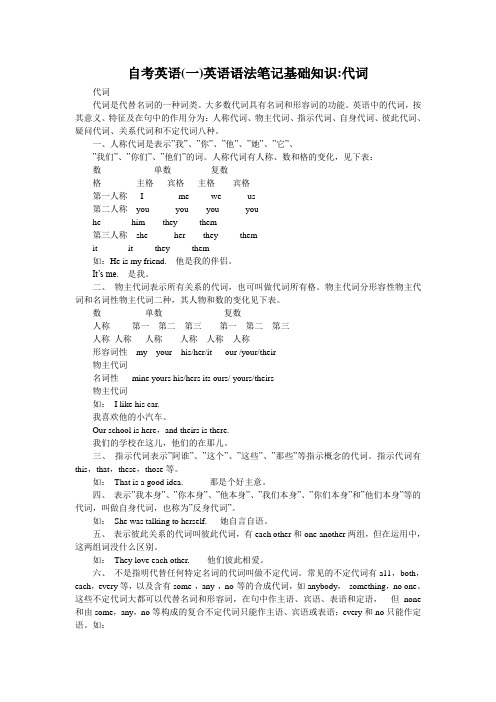
自考英语(一)英语语法笔记基础知识:代词代词代词是代替名词的一种词类。
大多数代词具有名词和形容词的功能。
英语中的代词,按其意义、特征及在句中的作用分为:人称代词、物主代词、指示代词、自身代词、彼此代词、疑问代词、关系代词和不定代词八种。
一、人称代词是表示”我”、”你”、”他”、”她”、”它”、”我们”、”你们”、”他们”的词。
人称代词有人称、数和格的变化,见下表:数单数复数格主格宾格主格宾格第一人称I me we us第二人称you you you youhe him they them第三人称she her they themit it they them如:He is my friend.他是我的伴侣。
It’s me.是我。
二、物主代词表示所有关系的代词,也可叫做代词所有格。
物主代词分形容性物主代词和名词性物主代词二种,其人物和数的变化见下表。
数单数复数人称第一第二第三第一第二第三人称人称人称人称人称人称形容词性my your his/her/it our /your/their物主代词名词性mine yours his/hers its ours/ yours/theirs物主代词如:I like his car.我喜欢他的小汽车。
Our school is here,and theirs is there.我们的学校在这儿,他们的在那儿。
三、指示代词表示”阿谁”、”这个”、”这些”、”那些”等指示概念的代词。
指示代词有this,that,these,those等。
如:That is a good idea.那是个好主意。
四、表示”我本身”、”你本身”、”他本身”、”我们本身”、”你们本身”和”他们本身”等的代词,叫做自身代词,也称为”反身代词”。
如:She was talking to herself.她自言自语。
五、表示彼此关系的代词叫彼此代词,有each other和one another两组,但在运用中,这两组词没什么区别。
英语语法全解之代词
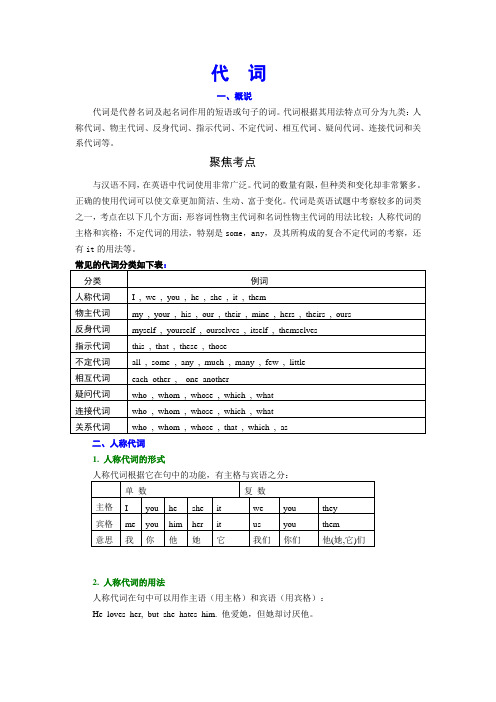
代词一、概说代词是代替名词及起名词作用的短语或句子的词。
代词根据其用法特点可分为九类:人称代词、物主代词、反身代词、指示代词、不定代词、相互代词、疑问代词、连接代词和关系代词等。
聚焦考点与汉语不同,在英语中代词使用非常广泛。
代词的数量有限,但种类和变化却非常繁多。
正确的使用代词可以使文章更加简洁、生动、富于变化。
代词是英语试题中考察较多的词类之一,考点在以下几个方面:形容词性物主代词和名词性物主代词的用法比较;人称代词的主格和宾格;不定代词的用法,特别是some,any,及其所构成的复合不定代词的考察,还有it的用法等。
二、人称代词1. 人称代词的形式2. 人称代词的用法人称代词在句中可以用作主语(用主格)和宾语(用宾格):He loves her, but she hates him. 他爱她,但她却讨厌他。
【说明】(1) 人称代词用作表语或用于than, as 之后时,可以用主格(较正式),也可用宾格(较口语化):“Who is it?” “It’s me.” “是谁呀?”“是我。
”He gets up earlier than me. 他起床比我早。
He speaks English as well as her. 他说英语说得跟她一样好。
但是,若than, as 后的人称代词后跟有动词,则必须用主格:He gets up earlier than I do.(此句不能用than me do)(2) 单独使用的人称代词通常用宾格:“I’d like a cup of tea.” “Me too.” “我想要杯茶。
”“我也是。
”(3)在电话中常用主格。
I wish to speak to Daming.我想和大明通话。
This is he.我就是3.常用人称代词的特殊用法。
(1)we they和you都可以指“人们”,因此不能翻译成“我们,你们,他们”They speak English in that country. 在那个国家,人们说英语。
代词知识点总结简单版

代词知识点总结简单版一、代词的分类1. 人称代词人称代词用来代替表示人或物的名词,分为主格、宾格、所有格和反身代词。
主格人称代词作为主语,宾格人称代词作为宾语,所有格人称代词表示所有关系,反身代词表示主语和宾语在同一个人上。
2. 物主代词物主代词用来表示所属关系,有形式和主体两种形式。
形式物主代词在句中作定语,主体物主代词在句中作宾语或表语。
3. 反身代词反身代词表示动作的主体同时也是动作的宾语,常用来表示主语对宾语的动作是自己。
4. 指示代词指示代词用来指示表示人或物的名词,分为远指代词和近指代词。
5. 疑问代词疑问代词用于提问句,询问人或物的种类、性质、数量或程度。
6. 关系代词关系代词引导定语从句,与先行词相互关联,并在从句中作主语、宾语、表语等成分。
7. 不定代词不定代词用来指代未具体确定的人或物,表示不确定的数量或程度。
二、代词的用法1. 主语位置人称代词、物主代词、反身代词、疑问代词、不定代词和指示代词都可以在句子中作主语。
2. 宾语位置人称代词、物主代词、反身代词、指示代词、疑问代词、关系代词和不定代词都可以在句子中作宾语。
3. 表语位置反身代词、指示代词、不定代词和关系代词可以在句子中作表语。
4. 定语位置指示代词、疑问代词、关系代词和不定代词可以在句子中作定语。
5. 各种代词的性数格变化人称代词、物主代词和指示代词根据其所指的名词的性数格的不同而有相应的变化。
如:he/him/his/himself; she/her/her/herself; it/its/it/itself; they/them/their/themselves等。
三、代词的使用注意事项1. 主谓一致当代词作主语时,应与谓语动词在人称和数上保持一致。
如:She is a student. They are students.2. 宾语位置当代词作宾语时,要注意宾格人称代词的使用,如:I like her. Can you help me?3. 定语位置指示代词、疑问代词、关系代词和不定代词在作定语时,应该放在其所修饰的名词之前。
英语语法代词
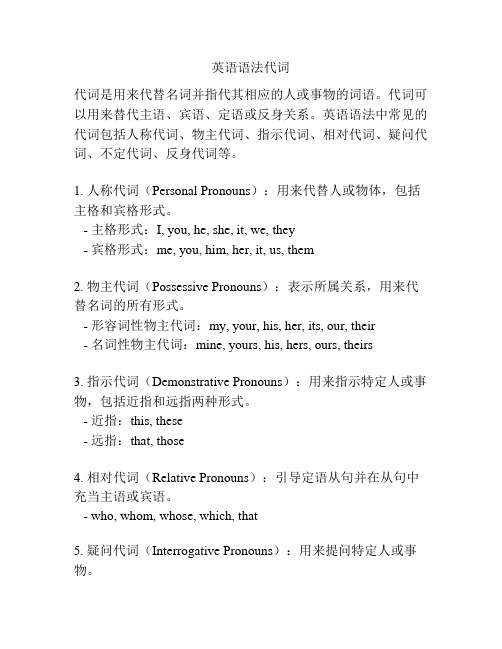
英语语法代词代词是用来代替名词并指代其相应的人或事物的词语。
代词可以用来替代主语、宾语、定语或反身关系。
英语语法中常见的代词包括人称代词、物主代词、指示代词、相对代词、疑问代词、不定代词、反身代词等。
1. 人称代词(Personal Pronouns):用来代替人或物体,包括主格和宾格形式。
- 主格形式:I, you, he, she, it, we, they- 宾格形式:me, you, him, her, it, us, them2. 物主代词(Possessive Pronouns):表示所属关系,用来代替名词的所有形式。
- 形容词性物主代词:my, your, his, her, its, our, their- 名词性物主代词:mine, yours, his, hers, ours, theirs3. 指示代词(Demonstrative Pronouns):用来指示特定人或事物,包括近指和远指两种形式。
- 近指:this, these- 远指:that, those4. 相对代词(Relative Pronouns):引导定语从句并在从句中充当主语或宾语。
- who, whom, whose, which, that5. 疑问代词(Interrogative Pronouns):用来提问特定人或事物。
- who, whom, whose, which, what6. 不定代词(Indefinite Pronouns):指代不确定人或物体的代词。
- some, any, no, all, each, every, few, many, several, someone, anyone, no one, everyone, etc.7. 反身代词(Reflexive Pronouns):表示动作的反身关系。
- myself, yourself, himself, herself, itself, ourselves, yourselves, themselves以上是英语语法中常见的代词,它们在句子中扮演着重要的角色,可以使句子更加简洁明了。
自考英语(一)重点语法复习(全)

一.名词不可数名词量的表示语:(1) 不可数名词可加表单位的形容片语,表示数的观念。
其公式为:数词+单位词+of+不可数名词(2) 各类表单位的形容词片语。
(A) 物质名词:a piece (suit) of armour a piece (slice) of cake a piece (an article) of furniture a piece of jewelrya piece (sheet) of paper a cake of soap a piece (slice) of bacon a piece (stick) of chalka bit (blade) of grass a piece (strip) of land a bit (grain) of rice a bowl of soup(B) 抽象名词 a word of abuse an item (a bit) of business an attack of fever a bit (an amount) of interest;a fit of passion a piece (word) of advice a piece of evidence a piece (an item) of information a piece (an item) of news;(C) 自然现象:a flash of lightening; a bolt of thunder;名词种类的表示语:kind of, sort of, type of, 三者都可接可数名词及不可数名词,其后的冠词a (an)常被省略。
之前可加a, the, some, any, etc.What kind of (a) pencil did you buy?I had a kind of suspicion that he was cheating.I like this kind of flower.I like flowers of this kind. (置名词后更强调种类)II. 名词的数:III. 名词的所有格:名词在句中表示所有关系的语法形式叫做名词所有格。
语法讲解代词的用法
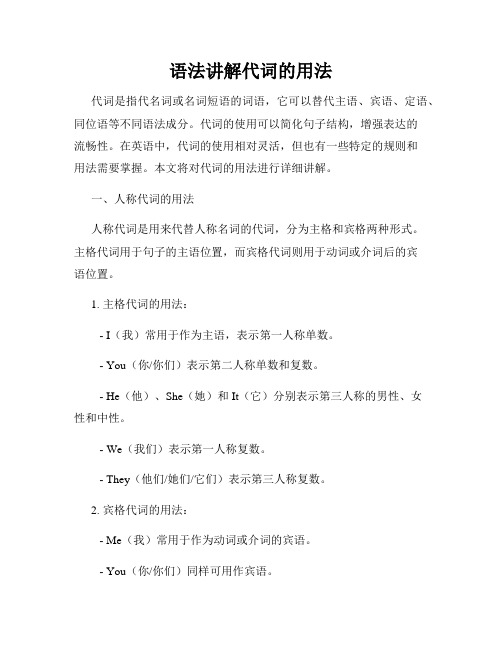
语法讲解代词的用法代词是指代名词或名词短语的词语,它可以替代主语、宾语、定语、同位语等不同语法成分。
代词的使用可以简化句子结构,增强表达的流畅性。
在英语中,代词的使用相对灵活,但也有一些特定的规则和用法需要掌握。
本文将对代词的用法进行详细讲解。
一、人称代词的用法人称代词是用来代替人称名词的代词,分为主格和宾格两种形式。
主格代词用于句子的主语位置,而宾格代词则用于动词或介词后的宾语位置。
1. 主格代词的用法:- I(我)常用于作为主语,表示第一人称单数。
- You(你/你们)表示第二人称单数和复数。
- He(他)、She(她)和It(它)分别表示第三人称的男性、女性和中性。
- We(我们)表示第一人称复数。
- They(他们/她们/它们)表示第三人称复数。
2. 宾格代词的用法:- Me(我)常用于作为动词或介词的宾语。
- You(你/你们)同样可用作宾语。
- Him(他)、Her(她)和It(它)分别用作第三人称的男性、女性和中性宾语。
- Us(我们)用作第一人称复数宾语。
- Them(他们/她们/它们)用作第三人称复数宾语。
二、指示代词的用法指示代词用于指示或代指句子中的名词或名词短语。
常见的指示代词有this(这个)、that(那个)、these(这些)、those(那些)。
1. This(这个)和These(这些)用于指代近处的人或物。
- This is my car.(这是我的车。
)- These are my books.(这些是我的书。
)2. That(那个)和Those(那些)用于指代远处的人或物。
- That is his house.(那是他的房子。
)- Those are our bicycles.(那些是我们的自行车。
)三、反身代词的用法反身代词用于强调句子中的主语,同时也表示主语自身做了某种动作或承受了某种影响。
常见的反身代词有myself(我自己)、yourself (你自己/你们自己)、himself(他自己)、herself(她自己)、itself (它自己)以及ourselves(我们自己)、yourselves(你们自己)、themselves(他们自己/她们自己/它们自己)。
代词知识点简单归纳总结

代词知识点简单归纳总结代词是指用来代替名词或名词短语的词语,其作用是用来避免重复,使语言表达更加简洁和流畅。
代词在语法上起着非常重要的作用,掌握代词的用法对于学习语言是至关重要的一环。
在英语中,代词有不同的类型和用法,我们来简单归纳总结一下代词的知识点。
一、人称代词人称代词是用来代替人或事物的一类代词,分为主格和宾格两种形式。
主格用来作主语,宾格用来作宾语或表语。
在英语中,人称代词有三种单数形式和三种复数形式,分别是I, you, he/she/it和we, you, they。
例如:I am a student.(我是一个学生。
)You are my friend.(你是我的朋友。
)He is a doctor.(他是个医生。
)She likes reading.(她喜欢阅读。
)It is a cat.(它是一只猫。
)We are classmates.(我们是同学。
)You are teachers.(你们是老师。
)They are singers.(他们是歌手。
)二、物主代词物主代词用来表示所属关系,也就是表示“我的”,“你的”,“他的”等等。
在英语中,物主代词有单数和复数的形式,也有形容词性和名词性两种形式。
例如:This is my book.(这是我的书。
)Is this your pen?(这是你的笔吗?)That is his car.(那是他的车。
)Her cat is very cute.(她的猫很可爱。
)Its color is blue.(它的颜色是蓝色的。
)Our school is big.(我们的学校很大。
)Is this your bag?(这是你们的包吗?)Their house is beautiful.(他们的房子很漂亮。
)三、指示代词指示代词用来指示人或物的位置、距离或者身份。
在英语中常用的指示代词有this, that, these, those等。
例如:This is my friend.(这是我的朋友。
英语语法 什么是代词
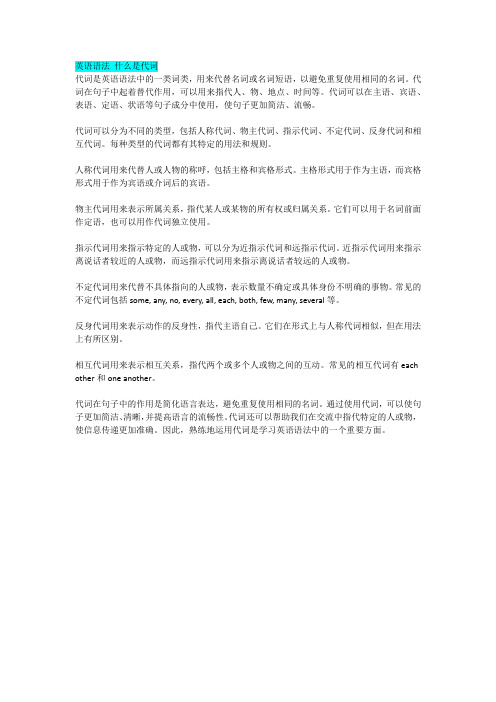
英语语法什么是代词代词是英语语法中的一类词类,用来代替名词或名词短语,以避免重复使用相同的名词。
代词在句子中起着替代作用,可以用来指代人、物、地点、时间等。
代词可以在主语、宾语、表语、定语、状语等句子成分中使用,使句子更加简洁、流畅。
代词可以分为不同的类型,包括人称代词、物主代词、指示代词、不定代词、反身代词和相互代词。
每种类型的代词都有其特定的用法和规则。
人称代词用来代替人或人物的称呼,包括主格和宾格形式。
主格形式用于作为主语,而宾格形式用于作为宾语或介词后的宾语。
物主代词用来表示所属关系,指代某人或某物的所有权或归属关系。
它们可以用于名词前面作定语,也可以用作代词独立使用。
指示代词用来指示特定的人或物,可以分为近指示代词和远指示代词。
近指示代词用来指示离说话者较近的人或物,而远指示代词用来指示离说话者较远的人或物。
不定代词用来代替不具体指向的人或物,表示数量不确定或具体身份不明确的事物。
常见的不定代词包括some, any, no, every, all, each, both, few, many, several等。
反身代词用来表示动作的反身性,指代主语自己。
它们在形式上与人称代词相似,但在用法上有所区别。
相互代词用来表示相互关系,指代两个或多个人或物之间的互动。
常见的相互代词有each other和one another。
代词在句子中的作用是简化语言表达,避免重复使用相同的名词。
通过使用代词,可以使句子更加简洁、清晰,并提高语言的流畅性。
代词还可以帮助我们在交流中指代特定的人或物,使信息传递更加准确。
因此,熟练地运用代词是学习英语语法中的一个重要方面。
自考现代英语语法重点
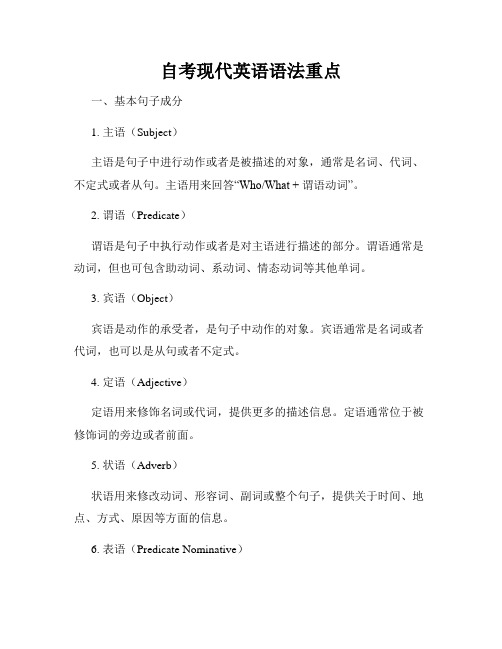
自考现代英语语法重点一、基本句子成分1. 主语(Subject)主语是句子中进行动作或者是被描述的对象,通常是名词、代词、不定式或者从句。
主语用来回答“Who/What + 谓语动词”。
2. 谓语(Predicate)谓语是句子中执行动作或者是对主语进行描述的部分。
谓语通常是动词,但也可包含助动词、系动词、情态动词等其他单词。
3. 宾语(Object)宾语是动作的承受者,是句子中动作的对象。
宾语通常是名词或者代词,也可以是从句或者不定式。
4. 定语(Adjective)定语用来修饰名词或代词,提供更多的描述信息。
定语通常位于被修饰词的旁边或者前面。
5. 状语(Adverb)状语用来修改动词、形容词、副词或整个句子,提供关于时间、地点、方式、原因等方面的信息。
6. 表语(Predicate Nominative)表语是指位于系动词之后,对主语进行补充说明、描述其身份、属性、状态等的一部分。
7. 同位语(Appositive)同位语用来进一步解释或说明前面的名词或代词,放在被解释的名词或代词的旁边。
8. 补语(Complement)补语用来补充或完善动词、名词、形容词等的意义,通常放在被补充词的后面。
二、句子结构1. 简单句(Simple Sentence)简单句是由一个主语和一个谓语构成的句子。
它可以有其他成分(如宾语、定语、状语等),但是只有一个主谓结构。
2. 并列句(Compound Sentence)并列句是由两个或多个简单句通过连词(如and、but、or、for等)连接而成的句子。
3. 复合句(Complex Sentence)复合句由一个主句和一个或多个从句构成。
主句可以独立成句,而从句不能独立成句。
4. 复合并列句(Compound-Complex Sentence)复合并列句是由两个或多个主句和一个或多个从句构成的句子。
三、动词形式1. 一般现在时(Simple Present)一般现在时用来表示经常性的动作、事实或习惯。
英语基础语法——代词(专升本英语)

1.反身代词的分类 反身代词指动作的承受者是动作执行者本身或强调动作所涉
及的人称的代词,也就是表示“我自己、你自己、我们自己”等的代词。 单数以-self 结尾,复数以-selves 结尾。具体如下:
人称 第一人称 第二人称 第三人称
数
单数
myself yourself himself,herself,itself
I teach myself English.我自学英语。 I don’t feel myself today.我今天感觉不舒服。 You can do it by yourself.你能自己做。
与反身代词常见的搭配:
1.devote oneself to… 献身于 例句:You should devote yourself to making money. 译文:你应该全心赚钱。
It is not known yet what caused the accident.尚不清楚事故的起因。
At my age I find it hard to get another job.在我这个年纪,我觉得很难 再找到另一份工作
即学即练 _________is unknown yet when he will arrive. A.This B.Those C.That D.It
时间做某事
It was/has been+一段 自从……有多
时间ቤተ መጻሕፍቲ ባይዱsince
长时间了
例句
It’s time for her to let go of the past 是她忘掉过去的时候了。
It took her two days to finish her homework
她花了两天时间完成她的家庭作业。
英语基础知识6(代词)
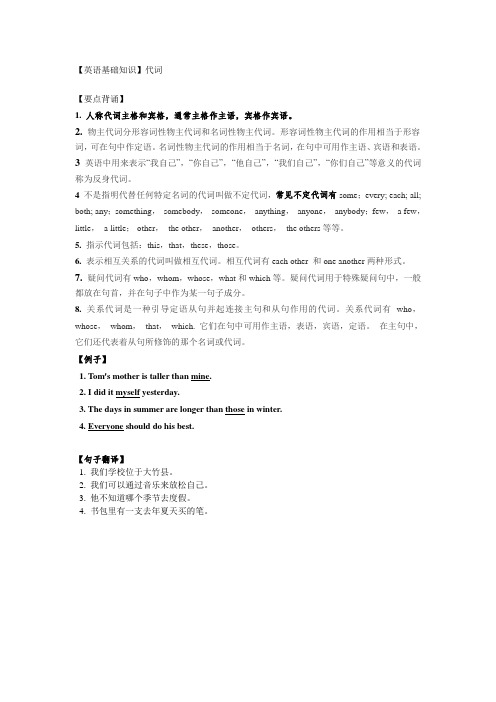
【英语基础知识】代词【要点背诵】1. 人称代词主格和宾格,通常主格作主语,宾格作宾语。
2. 物主代词分形容词性物主代词和名词性物主代词。
形容词性物主代词的作用相当于形容词,可在句中作定语。
名词性物主代词的作用相当于名词,在句中可用作主语、宾语和表语。
3 英语中用来表示“我自己”,“你自己”,“他自己”,“我们自己”,“你们自己”等意义的代词称为反身代词。
4 不是指明代替任何特定名词的代词叫做不定代词,常见不定代词有some;every; each; all; both; any;something,somebody,someone,anything,anyone,anybody;few,a few,little,a little; other,the other,another,others,the others等等。
5. 指示代词包括:this,that,these,those。
6. 表示相互关系的代词叫做相互代词。
相互代词有each other 和one another两种形式。
7. 疑问代词有who,whom,whose,what和which等。
疑问代词用于特殊疑问句中,一般都放在句首,并在句子中作为某一句子成分。
8. 关系代词是一种引导定语从句并起连接主句和从句作用的代词。
关系代词有who,whose,whom,that,which. 它们在句中可用作主语,表语,宾语,定语。
在主句中,它们还代表着从句所修饰的那个名词或代词。
【例子】1. Tom’s mother is taller than mine.2. I did it myself yesterday.3. The days in summer are longer than those in winter.4. Everyone should do his best.【句子翻译】1. 我们学校位于大竹县。
2. 我们可以通过音乐来放松自己。
自考英语英语语法基础材料代词
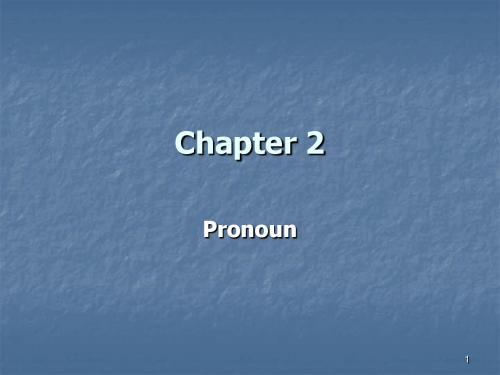
18
6. Interrogative pronoun
The pronoun can take an interrogative sentence such as who、whom、whose、 what and which,but when、where、why、 how are the interrogative adverbs. ----What whose which
10
(1)That \those refers to the thing (s) mentioned above,means this\these. We have no time to do it. That is our trouble I had a bad cold. That’s why I didn’t come. Those are the problems we want to solve.
Chapter 2
Pronoun
1
一.Kinds of the pronoun
Personal pronoun Possessive pronoun Self pronoun Reciprocal pronoun Demonstrative pronoun Interrogative pronoun Relative pronoun Conjunctive pronoun Indefinite pronoun
6
Note: In the following structures “the ”is used to stand for the possessive pronoun. ----He was wounded in the leg. ----He took me by the arms.
专升本英语代词

Practise
1. She is a friend of B .
A. my
B. mine
C. I
2. This isn’t my pen, it is
B
.
A. her
B. his
C. him
3. Frank can’t find C dictionary. Can you lend
to
?
A. her, mine, her
人称代词
主格:在陈述句中位于动词前面,在疑问句中位于be, can, 助动词和实义动词之间。在句中做主语。
She broke her leg while skiing. 她滑雪时摔断了腿。 We live in China and she is a great country. 我们住在中国,她是一 个伟大的国家。 (表示国家、城市、大地、月亮等名词时,可用she来指代,表示一种 亲密的感情。
They all can speak English. Whose pronunciation is the best? 他们都会说英语。谁的发音最好呢? Whose is better, yours or hers? 谁的更好,你的还是她的?
疑问代词
疑问代词的用法比较 (1)who与what的区别:who多用来问姓名、关系等,what多用来问
A. it
B. its
C. it’s
反身代词
反身代词又称自身代词,表示动作行为反射到行为执行者本身。 它还可以在句中起强调的作用,用以加强语气。
反身代词的构成:
1. 反身代词单数词尾都有-self,复数词尾都有-selves。 2. 第一、二人称反身代词由“形容词性物主代词+self或selves”
语法知识—代词的知识点
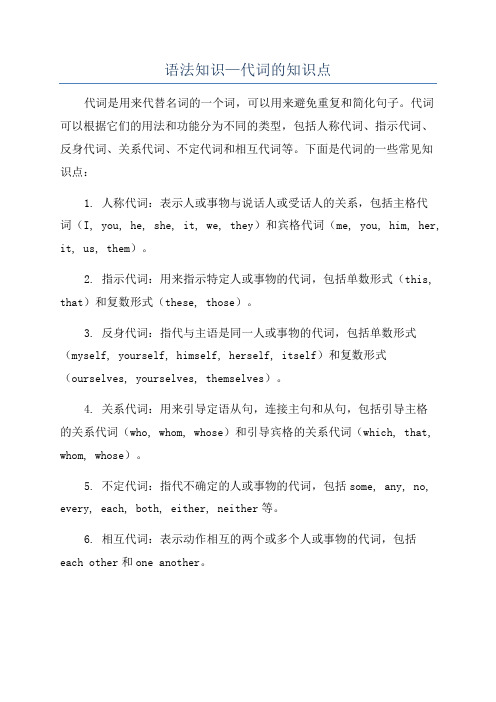
语法知识—代词的知识点
代词是用来代替名词的一个词,可以用来避免重复和简化句子。
代词
可以根据它们的用法和功能分为不同的类型,包括人称代词、指示代词、
反身代词、关系代词、不定代词和相互代词等。
下面是代词的一些常见知
识点:
1. 人称代词:表示人或事物与说话人或受话人的关系,包括主格代
词(I, you, he, she, it, we, they)和宾格代词(me, you, him, her, it, us, them)。
2. 指示代词:用来指示特定人或事物的代词,包括单数形式(this, that)和复数形式(these, those)。
3. 反身代词:指代与主语是同一人或事物的代词,包括单数形式(myself, yourself, himself, herself, itself)和复数形式(ourselves, yourselves, themselves)。
4. 关系代词:用来引导定语从句,连接主句和从句,包括引导主格
的关系代词(who, whom, whose)和引导宾格的关系代词(which, that, whom, whose)。
5. 不定代词:指代不确定的人或事物的代词,包括some, any, no, every, each, both, either, neither等。
6. 相互代词:表示动作相互的两个或多个人或事物的代词,包括
each other和one another。
除了以上常见的代词类型,还有其他一些代词的特殊用法和规则需注意。
在使用代词时,需要注意代词的数、格和性等与先行词保持一致。
同时,需要注意代词的位置和修饰词的选择,以确保句子的合理性和准确性。
自考英语英语语法基础材料代词
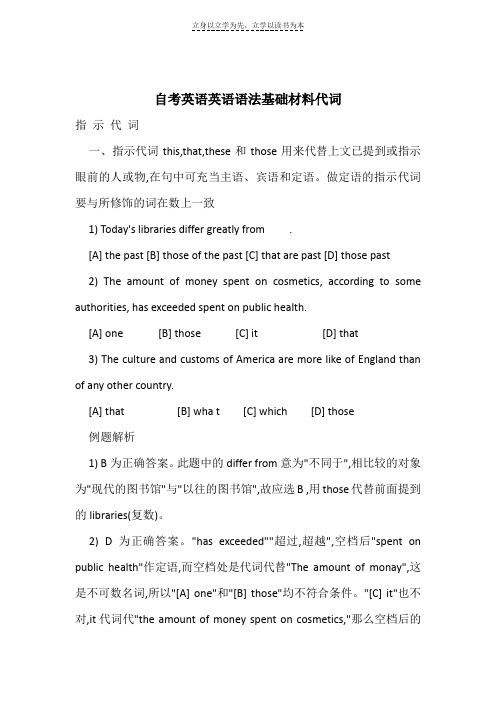
自考英语英语语法基础材料代词指示代词一、指示代词this,that,these和those用来代替上文已提到或指示眼前的人或物,在句中可充当主语、宾语和定语。
做定语的指示代词要与所修饰的词在数上一致1) Today's libraries differ greatly from .[A] the past [B] those of the past [C] that are past [D] those past2) The amount of money spent on cosmetics, according to some authorities, has exceeded spent on public health.[A] one [B] those [C] it [D] that3) The culture and customs of America are more like of England than of any other country.[A] that [B] wha t [C] which [D] those例题解析1) B为正确答案。
此题中的differ from意为"不同于",相比较的对象为"现代的图书馆"与"以往的图书馆",故应选B ,用those代替前面提到的libraries(复数)。
2) D为正确答案。
"has exceeded""超过,超越",空档后"spent on public health"作定语,而空档处是代词代替"The amount of monay",这是不可数名词,所以"[A] one"和"[B] those"均不符合条件。
"[C] it"也不对,it代词代"the amount of money spent on cosmetics,"那么空档后的"spent on public health"显然与"spent on cosmetics"相矛盾。
代词—专升本英语语法

1. --- Who is knocking at the door? --- I don’t know . I was lying in the bed and
just ask who ____ was. A. he B. she C. it
2. I can’t find my hat . I don’t know where I put ____.
二.物主代词
人 第一人称
第二人称
称 单数 复数 单数 复数
第三人称
单数
复数
分
类
形 容 my 词 性
ห้องสมุดไป่ตู้
our your your his her its their
名 词 mine ours yours yours his hers its theirs 性
2.形容词性物主代词和名词性物主代词的关系: 形容词性物主代词+名词=名词性物主代词 注意:名词性物主代词在句中所指代的关系是单数还 是复数。 These books aren't ours. Ours are new.
look after oneself
注意: 1) oneself 有单复数之分 * I enjoy myself. * Children, help yourselves to some fish.
2)反身代词可以加强名词或代词的语气,一般表示“ 亲自,本人”的意思。
I can manage it myself. 我自己能处理。
A. me B. myself C. itself
3. “Help ____ to some chicken ,”my mother said to the guests.
A. yourself B. yourselves C. your
自考英语课件 代词
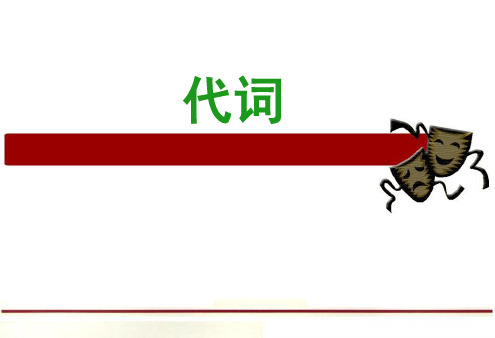
Fill in the blanks with pronouns ending in -self or -selves.
1. I am teaching ________ English. 2. This is a machine that works by __________. 3. She looked at ________ in the looking-glass. 4. The kids seem very pleased with __________. 5.The meeting __________ was quite interesting. 6.She thinks only about ________, never about other people. 7.Tom, no one will help you now. So please do it by ________.
5.The meeting _i_ts_e_lf______ was quite interesting.
6.She thinks only about _h_e_r_s_e_lf__, never about other
people.
7.Tom, no one will help you now. So please do it by
e.g.: This picture is clear and that picture is not clear. 2.打电话时用that问对方是谁,用this做自我介绍。 e.g.: This is Mary speaking.Who's that? 3.that(those)可以代替前面提到的名词,以免重复,this(these) 不能。
自考英语(一)复习资料第一章(4)
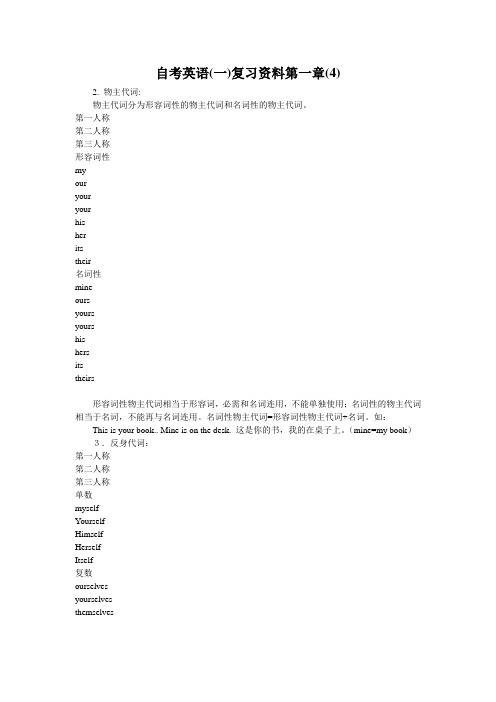
自考英语(一)复习资料第一章(4)2. 物主代词:物主代词分为形容词性的物主代词和名词性的物主代词。
第一人称第二人称第三人称形容词性myouryouryourhisheritstheir名词性mineoursyoursyourshishersitstheirs形容词性物主代词相当于形容词,必需和名词连用,不能单独使用;名词性的物主代词相当于名词,不能再与名词连用。
名词性物主代词=形容词性物主代词+名词。
如:This is your book.. Mine is on the desk. 这是你的书,我的在桌子上。
(mine=my book)3.反身代词:第一人称第二人称第三人称单数myselfYourselfHimselfHerselfItself复数ourselvesyourselvesthemselves4.彼此代词:each other, one another5. 指示代词是用来指示人或事物的代词,如:this, these, that, those.如:We have no water .That’s our trouble.我们没有水了。
这是我们的困难。
注:指示代词this, that可在句中作状语,表示程度,相当于so .如:He said he couldn’t walk that far.6.疑问代词who’s the girl in red?7.关系代词He’s a professor who has lived here for 10 years.8 .不定代词:1).复合不定代词由every, some, any, no与-one,-body,-thing构成的代词。
指人指人指物everyone everybody everythingsomeone somebody somethinganyone anybody anythingno one nobody nothing所有的不定代词都当作单数对待。
- 1、下载文档前请自行甄别文档内容的完整性,平台不提供额外的编辑、内容补充、找答案等附加服务。
- 2、"仅部分预览"的文档,不可在线预览部分如存在完整性等问题,可反馈申请退款(可完整预览的文档不适用该条件!)。
- 3、如文档侵犯您的权益,请联系客服反馈,我们会尽快为您处理(人工客服工作时间:9:00-18:30)。
--- Yes,I have one. --是的,我有一辆。
--- I don’t know any of them. 他们,我一个也不认识。
七、 疑问代词有 who,whom,whose,what 和 which 等。在句子中用来 构成特殊疑问句。疑问代词都可用作连接代词,引导名词性从句(主语从句、 宾语从句和表语从句)
如: They love each other. 他们彼此相爱。
六、 不是指明代替任何特定名词的代词叫做不定代词。常见的不定代词 有 a11,both,each,every 等,以及含有 some-,any-,no-等的合成代词,如 anybody, something,no one。这些不定代词大都可以代替名词和形容词, 在句中作主语、宾语、表语和定语, 但 none 和由 some,any,no 等构成的 复合不定代词只能作主语、宾语或表语;every 和 no 只能作定语。如:
如:Tell me who he is. 告诉我他是谁。
八、 关系代词有 who,whom,whose,that,which,as 等,可用作引导 从句的关联词。它们在定语从句中可作主语、表语、宾语、定语等;另一方面 它们又代表主句中为定语从句所修饰的那个名词或代词(通称为先行词)。
自考英语(一)英语语法基础材料:代词
代词
代词是代替名词的一种词类。大多数代词具有名词和形容词的功能。英语 中的代词,按其意义、特征及在句中的作用分为:人称代词、物主代词、指 示代词、自身代词、相互代词、疑问代词、关系代词和不定代词八种。
一、人称代词是表示”我”、”你”、”他”、”她”、”它”、
“我们”、”你们”、”他们”的词。人称代词有人称、数和格的变化,见下表:
数 单数 复数
格 主格 宾格 主格 宾格转自环 球 网 校 exam8
第一人称 I me we us
第二人称 you you you you
he him they them
第三人称 she her they them
我看到她和他们在一起,至少我认为是她。(her 做宾 语,them 做介词宾 语,her 做主语补语)
a. -- Who broke the vase? --谁打碎了花瓶?
b. -- Me. --我。(me 做主语补语= It’s me.)
说明:在上面两例句中,her 和 me 分别作主语补语。现代英语中多用宾 格,在正式文体中这里应为 she 和 I。
人称 人称 人称 人称 人称 人称
形容词性 my your his/her/it oБайду номын сангаасr /your/their
物主代词
名词性 mine yours his/hers its ours/ yours/theirs
物主代词
如: I like his car.
我喜欢他的小汽车。
Our school is here,and theirs is there.
我们的学校在这儿,他们的在那儿。
三、 指示代词表示”那个”、”这个”、”这些”、”那些”等指示概念的代词。指 示代词有 this,that,these,those 等。
如: That is a good idea. 那是个好主意。
如: He is the man whom you have been looking for. 他就是你要找的那个 人。
1 人称代词的用法
1)人称代词的主格在句子中作主语或主语补语,例如:
John waited a while but eventually he went home.
it it they them
如:He is my friend. 他是我的朋友。
It’s me. 是我。
二、 物主代词表示所有关系的代词,也可叫做代词所有格。物主代词分 形容性物主代词和名词性物主代词二种,其人物和数的变化见下表。
数 单数 复数
人称 第一 第二 第三 第一 第二 第三
---- Not me. --我可不要了。
人称代词之主、宾格的替换
1) 宾格代替主格
a.在简短对话中,当人称代词单独使用或在 not 后,多用宾语。
---- I like English. --我喜欢英语。
---- Me too. --我也喜欢。
---- Have more wine? --再来点酒喝吗?
When he arrived, John went straight to the bank.
约翰一到就直接去银行了。
2)人称代词的宾格在句子中作宾语或介词宾语,但在口语中也能作主语补 语,第一人称在省略句中,还可以作主语,例如:
I saw her with them, at least, I thought it was her.
约翰等了一会儿,最后他回家了。
John hoped the passenger would be Mary and indeed it was she.
约翰希望那位乘客是玛丽,还真是她。
说明:在复合句中,如果主句和从句主语相同,代词主语要用在从句中, 名词主语用在主句中,例如:
四、 表示”我自己”、”你自己”、”他自己”、”我们自己”、”你们自己”和”他们 自己”等的代词,叫做自身代词,也称为”反身代词”。
如: She was talking to herself. 她自言自语。转自环 球 网 校 exam8
五、 表示相互关系的代词叫相互代词,有 each other 和 one another 两组, 但在运用中,这两组词没什幺区别。
